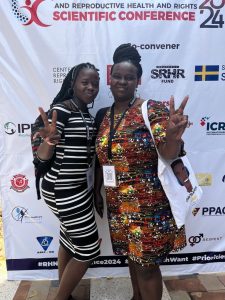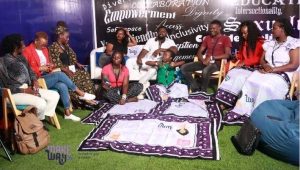Enhancing SRHR understanding in marginalised youth
 18 July 2024
18 July 2024

As Make Way regional and global youth representatives, we were thrilled to recently attend the Adolescent and Youth Sexual and Reproductive Health and Rights (AYSRHR) Scientific Conference in Kenya with the theme ‘priorities for advancing AYSRHR in Africa’. There were many key highlights from the conference. Firstly, the active inclusion of youth in this year’s conference to share their different insights and expertise in SRHR. Secondly, as Make Way youth representatives, we were given the opportunity to submit an abstract to the conference, alongside the Kenya youth representatives and our partners. Together, we presented an abstract on applying lobby and advocacy tools to enhance SRHR understanding in marginalised youth. Thirdly, to host a youth cafe safe space to discuss ongoing developments and provide a supportive environment for other youth.
What is the AYSRHR Conference?
The conference is held by Reproductive Health Network Kenya (RHNK) to provide ‘a platform for SRHR stakeholders, actors, champions and young people to share experiences and learn new information about SRHR from experts’.

Youth as active players
Adolescents and young people were actively present at the conference this year, with over 250 young people (an increase compared to last year) present. Together, youth shared their abstracts and innovations, as well as learnt from one another. It was encouraging and motivating to see youth in all their diversities passionate about SRHR advocacy strategies, digital innovations, research and implementation. It is important to acknowledge the efforts of youth and adolescents working towards advancing SRHR in their communities. Also, civil society organisations supporting youth participation meaningfully in various ways such as financially, logistically and in their work must be commended. The intergenerational commitment to advancing SRHR in Eastern Africa was very present at this conference and must continue to be encouraged if we are to harvest major gains in the SRHR movement.
Enhancing SRHR understanding in marginalised youth
We presented our abstract at the conference, titled ‘Bridging beliefs: Integrating social accountability and religious analysis tools to enhance SRHR understanding in marginalised youth’. We collaborated on the abstract with the Kenya youth representatives and partners The Circle of Concerned Women Theologians and VSO Kenya. The abstract endorses the use of religion and spirituality with social accountability strategies to improve the outcomes of advancing SRHR in communities – particularly in places where religion and spirituality play a critical role in society. The tools presented to enhance SRHR understanding in marginalised youth are the following Make Way lobby and advocacy tools:
- The Intersectional See-Judge-Act (ISJA) tool – aiming to facilitate analysis of religious SRHR issues.
- The Intersectional Community Scorecard (ICSC) tool – a citizen-driven accountability measure for assessment, planning, monitoring and evaluation of service delivery.
Within our abstract, we had two main calls-for-action:
- We call on governments, donors and the private sector to engage religious leaders in translating barriers to SRHR to opportunities.
- We call for the promotion of meaningful youth participation in resource allocation and decision-making.
Overall, we need key stakeholders such as governments, religious persons and youth to collaborate to ensure that SRHR are realised by all. In addition to presenting our own abstract, we also listened to other abstracts presented by other actors in the SRHR movement. Many different SRHR topics were explored including female genital mutilation, period poverty, disability inclusion and religion.
Youth Cafe Safe Space
On the last day of the conference, the Make Way Youth representatives, in collaboration with the Make Way Kenya collaborating partner Black Coffee Network, hosted a youth cafe safe space. In this safe space, we discussed the ongoing youth-led protests in Kenya online and offline dubbed #RejectFinanceBill2024. We were especially outraged by the proposed tax introductions of menstrual hygiene products by 16%, adult diapers at 16% and the rollback of funding for maternal healthcare in Kenya. We are pleased to see that the planned tax increases have now been revoked due to the protests.

Key takeaways
Our key takeaways from the AYSRHR RHNK conference 2024 can be captured by the old saying, “unity is strength”. The conference was attended by people from different walks of life and of different ages – all committed to advancing SRHR in sub-Saharan Africa. It was apparent to us that everyone is doing their own part in advocacy, research, program implementation and more towards this one goal. There is a need to continue supporting this movement in sub-Saharan Africa by donors and other actors including governments. The gains in the SRHR movement, especially in motivating the next generation of SRHR advocates and the groundbreaking research being conducted in areas such as retrogressive cultural practices and others, are slowly being realised and accepted in our communities.
Reconnecting
Our overall experience in this conference was valuable – providing many SRHR learning opportunities. Of course, some areas could have been improved by making the conference more inclusive, especially by providing sign language interpreters amongst other oversights by the conference organisers. All in all though, it was a rewarding learning experience to hear from so many SRHR experts and advocates and a fruitful networking space for ourselves as young people. Last but not least, it was also lovely to reconnect in person with the other Make Way youth representatives.



